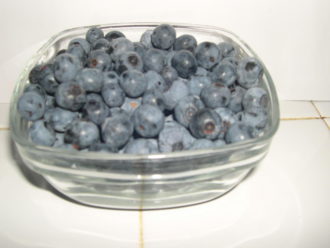LEXINGTON, Kentucky – University of Kentucky Cooperative Extension, through a Southern Sustainable Agriculture Research and Education (SSARE) On-Farm Research Grant, has developed a series of outreach materials for small fruit producers to aid in disease management.
“Like many diseases of small fruit, they are best managed using cultural practices, such as sanitation. Thus, we developed outreach materials to assist fruit growers with virus and disease management,” said Nicole Ward Gauthier, University of Kentucky Extension plant pathologist.
The materials include the following fact sheets and production manuals:
- Fruit, Orchard and Vineyard Sanitation – A fact sheet that discusses the effectiveness of a good sanitation program to help reduce the need for chemical controls.
- Midwest Blueberry Production Guide – A new publication focusing on plant health and cultural practices.
- Backyard fruit disease management using culture practices – A series of guides that covering low spray, no spray and organic options in apple peach, grape, brambles, strawberry and blueberry production. The four guides include:
- Backyard Apple Disease Management Using Cultural Practices
- Backyard Peach & Stone Fruit Management Using Cultural Practices
- Backyard Berry Disease Management Using Cultural Practices
- Backyard Grape Disease Management Using Cultural Practices
- Commercial Fruit Pest Management Guide – An annual spray guide with new sections added on cultural practices and low-input options.
The resources, found here, are part of a larger University of Kentucky outreach effort, funded by the SSARE grant (OS13-076), “Elucidating the Spread and Transmissibility of Blueberry Mosaic Virus: A new disease of blueberry in the Southeastern U.S.” Outreach efforts also included Extension agent in-service trainings and producer workshops.
Published by the Southern Region of the Sustainable Agriculture Research and Education (SARE) program. Funded by the USDA National Institute of Food and Agriculture (NIFA), Southern SARE operates under cooperative agreements with the University of Georgia, Fort Valley State University, and the Kerr Center for Sustainable Agriculture to offer competitive grants to advance sustainable agriculture in America's Southern region. This material is based upon work that is supported by the National Institute of Food and Agriculture, U.S. Department of Agriculture, through Southern Sustainable Agriculture Research and Education, under sub-award number: OS13-076. USDA is an equal opportunity employer and service provider. Any opinions, findings, conclusions, or recommendations expressed in this publication are those of the author(s) and do not necessarily reflect the view of the U.S. Department of Agriculture.
